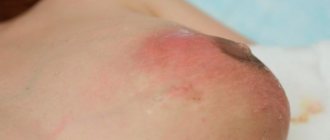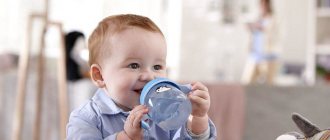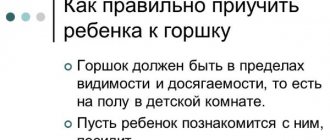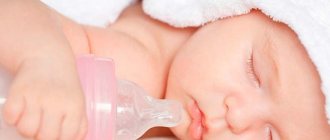After all, if at first children really need this item for physiological reasons, then as they grow up, the habit of sucking a pacifier has a psychological background and complicates the process of socialization of the little person.
After weighing all the pros and cons, the mother begins to wean her off the pacifier. However, the child does not like such interference, so he hides the pacifier in the stroller, takes it away from his peers on the street, cries and demonstrates his dissatisfaction in every possible way.
And yet, what is it like – proper weaning from a pacifier? How to avoid common mistakes, what rules should be followed, when to start work - at 12 months or at 3 years? The most popular methods of “fighting” the pacifier are presented below.
Does a baby need a pacifier?
Of course, the simplest thing a mother can do is not to introduce a pacifier from the very beginning. Then you won’t have to wean yourself. Unfortunately, only a small number of parents decide to abandon breast substitutes altogether. Many people wonder whether it is possible to give a pacifier to a child, worrying whether the bite will deteriorate, whether the baby will be late to speak, etc. But the need to perform other household chores or simply relax with a cup of tea inclines most women to use a pacifier. Its use is based on the baby's sucking reflex, which fully satisfies the baby's need for the calm and warmth of the mother. A bottle-fed baby also needs a pacifier to train the facial muscles involved in sucking the nipple of a bottle with formula. The sucking reflex weakens around the age of one. But the baby gets so used to his pacifier that he perceives any attempt to deprive him of this fun as screaming and yelling.
Cancellation up to 1 year
For a baby under one year old, it is better to wean off the pacifier smoothly. You should give the pacifier less and less throughout the day. It is good to feed before bed so that you can sleep longer, especially at night. Distract the baby with games, stories, new impressions. Gradually the need for pacifiers will disappear.
At night after long water procedures, you can give your child a relaxing massage. When going to bed, read a fairy tale, sing a song, develop your own special ritual. Then the one-year-old baby will learn to fall asleep without a pacifier.
Pros and cons of using a pacifier
The baby begins to suck his finger while still in his mother’s belly. In the first months and years of a child's life, the sucking reflex is very strong. For children up to one year old who do not suckle at their mother's breast, pacifiers satisfy their sucking instinct. If there is no pacifier, no breast, then there is a chance that the child will start sucking his thumb, and this habit is much more serious than the habit of using a pacifier. Therefore, the question of whether it was worth accustoming a child to a pacifier or not is completely ambiguous and has its pros and cons.
Benefits of pacifiers and which babies need them
- Cranky and restless babies need a pacifier to calm them down.
- The child falls asleep faster; he does not need to lie at his mother’s breast for an entire hour.
- The pacifier distracts the baby during unpleasant procedures, for example, vaccinations, changing clothes.
- It is much easier to wean a child from sucking a pacifier than from sucking his own finger, because the pacifier can be removed, hidden, cut up and thrown away.
- When teething, the child uses a pacifier to massage his gums and reduce discomfort.
Negative aspects of a pacifier
Although it has already been scientifically proven that the pacifier does not cause crooked teeth and does not change the bite, there are certain negative aspects of this habit:
- A child who does not want to give up a pacifier begins to talk later than other peers. A pacifier in a baby’s mouth prevents him from repeating the sounds and words that adults pronounce. Lack of development of speech and communication skills leads to later development of thinking.
- Sometimes sucking helps the baby compensate for the lack of parental love and attention, and after separation from the pacifier the child feels lonely.
Pros and cons of pacifiers
Consequences of not taking the issue seriously
Sometimes parents’ ignorance leads to a situation where their already quite old child (2 years old) sucks a pacifier. This is fundamentally wrong. The negative consequences of such a habit were mentioned above in the article. Most often, a bad bite is formed, in which the front incisor teeth protrude forward, and this is in the best situation. However, this may be followed by a series of other pathologies: mouth breathing or inflammation of the lip border.
There are more advanced cases when a 4-year-old child sucks a pacifier. Here, in addition to malocclusion and other pathologies, psychological dependence on the pacifier arises. The child constantly sucks the pacifier, especially in stressful situations. Whenever parents try to wean their baby from this habit on their own, he begins to be capricious and cry. Only long-term consultations with a psychologist can help cope with a problem of this nature.
Is it time to wean off the pacifier?
Many parents are interested in the question of when to wean their child off a pacifier? Until the age of one, you don't have to worry about your baby keeping the pacifier in his mouth because it's natural. However, when you see, for example, a three-year-old girl with a pacifier, while wearing high-heeled shoes, the first thing that comes to mind is that parents do not care about the health of their child.
No one will give an exact answer; everything depends individually on the development and behavior of each individual child. You can try raising babies with a pacifier at the age of eight to nine months. It is at this time that the baby develops a chewing reflex and the need for sucking decreases.
Of course, it’s okay if the baby continues to suck a pacifier even until he’s two or three years old, but it’s advisable to wean him off as early as possible. Over time, sucking a pacifier becomes for a child no longer a means of satisfying the sucking reflex, but a habit, the same as for cigarette smokers. There is no special remedy or drug that will make the child forget about sucking the pacifier; parents need to do a whole range of measures in order to pick it up without much stress for the child.
Reasons for addiction
The sucking reflex is one of the most important for a newborn; moreover, it is a natural necessity. That is why, when a child is born, doctors always check this stereotypical reaction.
If the sucking reflex is at an optimal level, the baby will be able to “produce” milk well and develop optimally. Otherwise, experts draw a conclusion about physiological or neurological disorders.
A child who is exclusively breastfed and receives breastfeeding on demand can suck on his mother’s nipple almost around the clock. Thus, he not only eats, but also satisfies his sucking reflex. In this case, a pacifier is not needed.
However, in practice, such a frequent need to breastfeed a child is very exhausting for a woman who is already tired after childbirth. She begins to get overtired and irritated, which can ultimately have a negative impact on the baby. As a solution: a pacifier to satisfy the desire to suck the nipple.
It's another matter if the baby is artificial. Getting food from a bottle requires less effort than sucking on the mother's breast to obtain milk. The child quickly becomes satiated, but the sucking reflex remains unsatisfied.
In such a situation, a silicone accessory becomes a good helper for the mother, and for the baby - a simulator, a sedative and a means to satisfy important basic needs.
A pacifier is not always needed, so you should not introduce your child to it if:
- a woman is ready to breastfeed a newborn whenever he needs to satisfy the sucking reflex;
- the baby spits out the silicone device;
- the child easily calms down and stops crying as soon as his attention is distracted by something interesting (for example, a toy).
Thus, the child’s addiction to the pacifier is due to both physiological (sucking reflex) and psychological (sedative) reasons. Moreover, the first factor smoothly flows into the second over time, only strengthening the attachment.
Does your baby put his finger in his mouth? In this case, it will be useful to read an article by a psychologist on how to wean a child from thumb sucking.
Proven ways to wean your baby off the pacifier
Naturally, the baby will resist with all his might, forcing his parents to return his favorite pacifier. Children do not like it when their usual order of things suddenly changes. But parents should be patient and firm so that your intentions of weaning your beloved child from the pacifier are crowned with success.
So
:
Tip #1
The main thing is on time! It is important to choose the right moment, to feel your child’s readiness to wean from the pacifier. The optimal age when it is quite possible to wean a child off a pacifier is six to nine months and a year and a half. Some babies require the presence of this infant attribute until they are two years old. There is nothing wrong with the fact that a child sucks a pacifier for so long, but measures need to be taken.
Tip #2
Individual approach! Be sure to take into account the age characteristics of the child. So, for example, if you are weaning a baby in infancy, then try to teach him to drink from a mug or a special sippy cup. This will minimize contact with the nipples. Also, try not to give a pacifier unless your child insists. Therefore, it is better not to keep it in a visible place. You can explain to babies 1-2 years old why they should not use a pacifier. Have a “serious” conversation about how the little one is already big and doesn’t need his favorite pacifier, that they will laugh at him in the sandbox, etc.
Tip #3
Be creative! When thinking about how to wean your baby from sucking a pacifier, do not forget to use different methods. Tell a story according to which a cat stole a pacifier or was carried away by birds, or that a very little girl from a neighboring apartment needs a pacifier. Let your little one help you pack this accessory beautifully and give it to the new parents. Some mothers offer an interesting way to wean off the pacifier: you need to carefully cut the tip of the pacifier by 1-2 mm with scissors and give it to the child. The pacifier loses its charms, and many babies quietly stop using it.
Tip #4
Difficulties are in a dream! The hardest thing is to wean a child who is accustomed to having the pacifier constantly in the mouth during sleep. In this case, the mother will need a lot of patience and the ability to control herself - the child will probably cry loudly and fall asleep for a long time, and once asleep, wake up often. Parents should calm the baby down, sing him lullabies, etc. If your child throws a tantrum, you need to back off and return the pacifier.
Tip #5
Rule of five no's. When weaning your toddler off the pacifier, to avoid causing mental trauma, follow the five “don’ts”
:
- Don't yell at the little one.
- Don't take it out on him because of his failures.
- Don't deceive the little one.
- Don't tease your baby or offend him.
- Do not scare the baby under any circumstances.
Experience and feedback from parents
Olga Palamarchuk After a year, my husband came to the conclusion that our Mishka is already big and must live without a pacifier. At that time he was one year and three months old. I agreed. But the process of weaning itself became some kind of impossible quest. To solve the problem, they used old-fashioned methods. The schemes were incredible.
At first, the “pipe” was carried away by grandfather’s rabbit, which he saw on the farm. The night passed like hell. I have never encountered anything like this even during weaning. In the morning I gave up and regretted it, giving away my pet.
Then she smeared it with spices and salt. A barbaric method, but my grandmothers advised it. We obeyed them in everything.
Doctor Komarovsky's video saved us. Who was more adequate than us in this matter. He said that it is not fatal, and it is useless to wean it off. They stopped mocking their son and waited. Three months have passed since the night of refusal. We tried again to remove the pacifier, but it didn’t work. Soon, on his own, he began to manage without a pacifier during the day. Before this, the time spent with the “favorite toy” was reduced. On the advice of the doctor, we tried to remove it when falling asleep and it worked the first time.
At night, however, I woke up and looked for a pacifier. I had to give it to him when he started crying. The next evening, we bathed in the bath with the addition of a soothing infusion of herbs, fell asleep without a pacifier and slept until the morning.
Valentina, 28 years old: “When my daughter was one and a half years old, we were at the zoo. There she dropped the pacifier and was not even upset, since there was somewhere to direct her attention. Dashulya and I threw the pacifier in the trash and moved on. And since then they haven’t remembered her.”
Victoria, 30 years old: “My advice is not to listen to pre-war methods of weaning. I tried to smear mustard on the pacifier and really regretted my decision - Misha began to have a severe allergic reaction. At first there was a small rash, and then my son began to choke. I was seriously scared and called the pediatrician.”
Irina, 23 years old: “As for me, you shouldn’t force children to throw away bottles and pacifiers. The moment will come when the child will lose interest in them on his own. This happened to my eldest daughter when she was two years old, and to her son even earlier – he was 1 year old. I didn’t experience any problems with eating or going to bed.”
When should you not take your baby's pacifier away?
When weaning is not recommended:
- During the period of teething.
- At the time of illness.
- There is a stressful situation in the family.
- You are not at home with your baby (trips, travel, moving).
- You leave the baby with another person (registration in a nursery, nanny).
How exactly to wean a child off a pacifier depends abruptly or gradually on the character of the parents and the baby himself; in this case, there is no fail-safe recipe, there are only general tips that you can use or simply take into account.
“Who should I give a pacifier to?” - an effective weaning method
Most young parents believe that the best way to force their child to give up a pacifier is to ask him to give it to someone, for example, a sister or brother, if he has one. If the child is alone in the family and there are no kids around who are so close to him, then you can give a pacifier to a cat, a squirrel in the park, a crow with its chicks, and so on, you can think of anything. Until the baby himself decides to give up the pacifier, no measures taken by the parents will have any result, at least without hysterics.
Using this method, it is worth remembering that if the baby does not want to give a pacifier, in no case should you take it away, put moral pressure on it, or say that he is greedy. We must try to do everything so that the donation process does not turn into a drama for the child. If the baby categorically does not want to part with the pacifier, this indicates that the time has not yet come when you need to try to wean him, and you just need to wait.
Additional recommendations
In addition to generally accepted recommendations, it is useful to study the opinions of other parents who have encountered a similar problem and use their tricks and advice:
- When complementary feeding begins, the pacifier can be replaced with a nibbler. This device is easy to make yourself or buy ready-made. The essence of its use is the ability to replace a piece of rubber with a device into which you can put grated vegetables and fruits inside.
- For older children, you can buy a musical instrument that develops the respiratory organs and involves the mouth in the process (starting with a whistle and ending with a trumpet).
- Physical and emotional load to the maximum. Long walks in the fresh air, active games at home, then taking a bath with soothing oils (if you are not allergic to the components) and sleeping at night.
- Complete transition to feeding from a spoon and drinking from a cup.
- Replacing pacifiers with chewers, teethers and similar items.
- Do not rush to give a pacifier at the first tears, only if there is an insistent demand.
- To make it easier to wean yourself off the pacifier before falling asleep, the best way is to come up with new activities to calm your activity: reading books, a lullaby, rocking in your arms.
Despite all the advice and recommendations, the best assistant was and remains the maternal instinct. He is the only one who knows and takes into account the individual characteristics and capabilities of your child. By listening to him, you will certainly be able to get through this emotionally difficult stage with minimal losses.
What not to do
In order for the process of weaning a child from a pacifier to give a positive result, you should not allow the following actions:
- You should never scold your baby because he is old enough and still sucks a pacifier. He is unlikely to understand why you are yelling at him, but he may get scared. As we know, children copy adults and their behavior, and if you constantly throw a tantrum over a pacifier, the child will most likely do the same. If you approach the weaning process with kindness, calmness and patience, then the baby will be less worried about parting with her.
- Some mothers, in order to wean their child off the pacifier, smear it with various tasteless compounds such as mustard, chloramphenicol ointment, however, this is absolutely not worth doing. Firstly, by doing so you cause the baby offense and anxiety, and secondly, you develop fear in him, because, as you know, it is in the first year and a half that children learn about the world around them through their mouths, that is, they need to taste everything. Thus, when a child puts a familiar pacifier into his mouth and unexpectedly realizes that it is bitter, he develops a fear of other things that were familiar to him from the cradle.
- You cannot intimidate the baby with the idea that if he does not stop sucking the pacifier, something terrible will happen to him, for example, a wolf will come and take him into the forest. With these methods you expose the child to additional stress.
- There is no need to compare your child with children and shame him that others already go without a pacifier, but he is like a little one. Regardless of what methods you use to wean your child off the pacifier, the main thing to remember is that you are a source of positive emotions for your baby and nothing else, he should feel supported by you.
- There is no need to change your chosen tactics. Even if something doesn’t work out and the baby still throws tantrums because the pacifier disappears, you need to try to control yourself and not get angry. You should never give a child a pacifier back under the influence of his screams, because he will immediately understand that with screams and hysterics he can achieve everything he needs.
Important tips for parents
There are also several recommendations that will help you make the process of weaning your child off a pacifier as painless as possible:
- If you notice that your baby is sucking a pacifier, do not shame him in any way, and certainly do not scold him. Swearing has never been effective in parenting, especially with young children. But praise can be your good assistant in weaning off the pacifier. Children really appreciate their parents' praise and approval.
- Under no circumstances should weaning a baby from a pacifier occur at the same time as other significant events for him - going to kindergarten, moving, mother going to work, etc. The most important thing that is simply necessary for a child’s peace of mind and his harmonious development is stability. Therefore, you should not place a double burden on the baby’s psyche.
- Never try to wean your baby off the pacifier while he is sick. This will not only have a traumatic effect on the baby’s psyche, but can also actually worsen his health.
- Do not delegate weaning your child from the pacifier to relatives - dad or grandmother. The baby needs his mother’s support during this difficult period of his life.
- If you have decided to wean your child off a pacifier, do not go backwards. Your actions should be consistent, gentle, but nevertheless persistent. You should not make the slightest concession not only to the child, but also to yourself. After all, it is precisely because of the relaxation of herself during sleepless nights and children's hysterics that the mother cannot stand it and again gives the baby a bottle. But the more strictly you follow the rules you set, the easier and faster the child’s weaning from the pacifier will be.
- When weaning off a pacifier, remember that most often children require a pacifier if they are upset about something, are very tired, or are bored. Try to prevent such situations from occurring. And if you still cannot avoid it, do not leave the baby alone with your mental discomfort - calm the baby down, distract him from your emotional experiences.
- Very often a baby starts asking for a pacifier simply because he is bored. Therefore, when deciding how to wean your child off the pacifier, try to ensure that the child’s free time is constantly occupied with something: games, drawing, reading together. Try to spend more time with your child and go for walks. If the child still very insistently demands a pacifier, try to find an alternative replacement - an apple, juice or milk through a straw.
Coming to bed. Problems falling asleep
Very often, when weaning a child off a pacifier, difficulties arise precisely when putting him to bed. The baby is used to falling asleep with a pacifier and cannot fall asleep without it. Whims and hysterics begin. In such a situation, the physical fatigue of the baby will help a lot. Walk with him longer, play outdoor games, before going to bed at night, you can take a long bath in cool water so that the child spends as much energy as possible. Before going to bed, you need to feed him well, then the baby will fall asleep faster and sleep longer. It is worth being patient and overcoming this small difficulty.
How to wean your baby off a bottle nipple
After you wean your baby off the pacifier, there will come a time when weaning your baby off the bottle will also become imperative. The mother must also decide for herself when to wean the child off the bottle - she will definitely notice that the baby is ready for this. There is no clear opinion among pediatricians about when and how to wean a child off the bottle. Some children are able to do without a bottle at 10 months, while others cannot go without a bottle at two years.
However, from about 10 months you can introduce your baby to a sippy cup. By the way, a sippy cup is the easiest way to wean a child off a bottle. Buy a bright and colorful sippy cup that can attract your baby's attention. As a rule, at this age all children are drawn to everything new and unknown. And they will happily drink from the sippy cup.
After some time, the lid of the sippy cup can be removed, turning it into a cup. Children very quickly get used to drinking from a cup and willingly part with the bottle. If your baby is stubborn, you can use a little trick - dilute the milk in the bottle with water, and leave it whole in the cup. The baby will very soon notice the difference and will prefer to drink from a cup.
Selecting a product by age
Usually, on the packaging of a pacifier, the manufacturer indicates in Roman numerals what age it is intended for. Parents should adhere to this marking, because the division by year was not invented for nothing. Small nipples are made for small children, and larger ones for older children.
Below is the marking in Roman numerals according to age:
- Ӏ – from 0 to 6 months;
- ӀӀ – from 6 months to 1.5 years;
- ӀӀӀ – from 1.5 years.
Opinion of a psychologist, dentist and speech therapist
Speech therapists’ opinions on pacifiers
According to speech therapists, early refusal of a child to breastfeed and transfer to spoon feeding does not allow the facial muscles and tongue muscles that are involved in the speech process to develop properly. Thus, by not giving a pacifier, parents deprive him of the opportunity to satisfy his natural instinct - the sucking reflex, which further affects his ability to articulate and pronounce certain syllables, especially those that involve the tip of the tongue.
At the same time, prolonged use of a pacifier leads to the fact that the baby begins to try to speak through the pacifier, which leads to incorrect formation of his speech.
A pacifier in the eyes of a psychologist
Psychologists do not have a clear opinion about pacifiers, which is not surprising. Some confidently declare that it prevents children from exploring the world by tasting it, while others declare the need for a pacifier for those children who do not receive proper attention and love due to the constant employment of their parents. And indeed, sucking a pacifier is the only way for a baby to distract himself from grievances and turn his attention to this process.
The opinion of dentists on this matter
Up to about six months, babies retain a sucking reflex, which can be satisfied by breastfeeding, bottle feeding, and also by sucking a pacifier. If the parents categorically do not give the baby a pacifier, experiencing a deficiency of sucking activity, he may pull various available objects into his mouth, including a finger.
At the same time, the load when sucking a finger is not distributed evenly on the jaw, as is the case with a pacifier, the bite is disturbed, and weaning a child from thumb sucking is not as simple as weaning it from the pacifier, since in extreme cases it can simply be hidden, which with a finger you can't do it. At the same time, prolonged and constant sucking of the pacifier can also lead to malocclusion.
Terms of use
1. After purchasing, the pacifier must be washed and disinfected. Boiling for a few minutes will suffice.
2. It is advisable to store the pacifier in a special cap, which is already included with modern models.
3. You cannot lick the pacifier yourself if you are going to give it to your baby later. Often parents are guilty of this.
4. It’s better to get identical nipples in advance. Children often drop them or deliberately throw them on the floor, then ask them to pick them up. It’s good if in such a case there are two identical pacifiers, the dirty one can be hidden and the clean one can be given to the baby. It is clear that you should not give a pacifier from the floor. Otherwise, the child will get used to putting everything dirty in his mouth. And then you will suffer, not knowing how to wean yourself off the pacifier from the floor.
5. If the pacifier falls out of the child’s mouth when he has already fallen asleep, there is no need to give it again; let him sleep without it.
6. There is no need to immediately grab the pacifier if the baby cannot fall asleep for a long time. Otherwise, he will get used to falling asleep only with her, and it will be difficult to wean him off from this later. You should be patient and try to lull the child to sleep yourself.
How to wean a child off a pacifier: advice from women on the forum
And bath
My son was 1 year and 10 months old when I decided to wean him off. He fell asleep only with her, at night he might not look, or he might look. During the day I took it when I was upset about something. I was worried that the youngest (at that time 2 months old) was actively sucking the pacifier and thought that this would make the older one even longer weaned. But no, one morning we “lost” her; the mouse carried her away to her little mice. On the first day there were tears, but not a lot (when going to bed at night) - I calmly said that when the mice had enough of playing, they would give it back. On the second day I remembered a couple of times, I said that the mice had her, I whined and that was it. From the third day I practically didn’t remember.
Oksana
We were 2.1 and I decided it was time to wean off. I sucked endlessly both at home and at night. A friend advised me to cut the pacifier into 4 parts. She became all ugly. They take it to suck, it doesn’t work and throws it away. So 2-3 days and we weaned ourselves off. But I slept restlessly at night for about a week. She had a lot of stress during the day.
H3:
Kate
The son did not want to part with the pacifier: he slept only with it, and during the day he also periodically looked for it. The pacifier was already all chewed up into junk, but no, there was no way without it. I bought a new one (although I didn’t want to, it was already 2.5 years old). I threw out the old one, gave him a new one, he pushed his horn - where is my red pacifier?! I say: she's broken. He cried, but refused to suck the new, green one, so he fell asleep. The next morning he already agreed to the green one, but I offered him either a pacifier or a new machine - he chose the machine. Then for another week I remembered where the red pacifier was - it was broken. Where is the green one? We exchanged it for a car. Sobbing. Then I forgot. By the way, before this, for two months in kindergarten he fell asleep during the day without a pacifier, so I understood that he could do without it.
Svetlana
We somehow gradually switched to bedtime mode (to fall asleep, then take it away) and if I cried a lot (fell, hit myself) they gave it to me. If you didn’t pick it up at night, or slept restlessly, then in the morning the rule is: when you wake up, give me a pacifier. And on the shelf, higher up. I didn’t want to rape my son. He chewed it up and got dirty with it - that was fine with him. Even though I knew that you could buy a new one))). Then I fell asleep calmly without her, but it took longer. Now (at 3.3) I have a pacifier under my pillow. If you have a bad dream, then I give it to you to calm down quickly.
If you didn’t pick it up at night, or slept restlessly, then in the morning the rule is: when you wake up, give me a pacifier. And on the shelf, higher up. I didn’t want to rape my son. He chewed it up and got dirty with it - that was fine with him. Even though I knew that you could buy a new one))). Then I fell asleep calmly without her, but it took longer. Now (at 3.3) I have a pacifier under my pillow. If you have a bad dream, then I give it to you to calm down quickly.
Lena
Initially, we only had a pacifier for sleep; we were given it very rarely during the day while we were awake. I unlearned it myself in a few days - I got sick and my nose was clogged. I tried to suck the pacifier, but, of course, it didn’t work. we removed it and he didn’t remember it anymore.
Tonya
The son sucked the pacifier for a long time. almost up to 2.5 years. My husband has already eaten my brains out that it’s time to wean the child. but for some reason it didn’t bother me too much. yes, it seems like we need to wean him off, but I somehow felt sorry for my son. and then he got sick with rotavirus. he was constantly sick and vomiting. and with the pacifier the nausea intensified. and he himself understood this and allowed me to remove it. While he felt bad for 3 days, he didn’t remember her at all. As soon as I felt better, I started asking for a pacifier. I said that the pacifier became infected with a disease and I threw it away, otherwise he would get infected again from the pacifier and would vomit. He listened to my arguments. He very easily agreed that he didn’t need a contagious pacifier and we forgot about it. There was at least one benefit from this disease.
Lina
You need to wean off gradually, first limiting sucking as much as possible during the day, distracting the baby. And then you can arrange a ritual of giving a pacifier to a little lala, for example, she is crying, she needs it more. Or give it to a cat, dog, you can come up with many options. I wouldn’t put anything bitter or tasteless on the pacifier.
Elina
My experience in weaning children off pacifiers is not easy. The first daughter, at the age of 1 year, herself refused the nipple and threw everything away. On the second, we, as developed parents, decided to take away this item, which in our opinion was unnecessary, within six months. The baby began to suck his finger, and categorically refused the pacifier, which we decided to return. The thumb definitely tasted better. The struggle was unequal until she was 2 years old, special bitter varnishes from the pharmacy did not help, the daughter indulged in her favorite pastime with pleasure, despite the bitterness. The finger became thinner (really!), and the upper jaw began to protrude forward. I had to swaddle (wrap) my arms for a month, but it helped. Don’t repeat our mistake, just gradually reduce the baby’s contact with the pacifier, leaving it, for example, only while falling asleep. The baby will refuse on his own; no one sucks a pacifier until the age of 18.
Alina
A pacifier for a baby is a kind of comforter, a friend. Therefore, it is better not to resort to barbaric methods (such as mustard, pepper) of weaning off the pacifier. Otherwise, you can simply get psychological trauma. For our child, we immediately rejected this option. Ideally, the baby should stop sucking a pacifier by the age of three. Until then, it is better to wean him off gradually, increasing the intervals between sucking the pacifier, until the baby completely forgets about it. It is ideal to stop bottle feeding and giving the baby a pacifier at the same time. You can give the pacifier a “send-off”. Our son gave a pacifier to the dog and never thought about it again. The main thing at the time of weaning is to give the child as much attention as possible and in no case get angry if something doesn’t work out. Adults also do not always succeed in quitting smoking the first time.
Sources:
https://jlady.ru/interesno/kak-otuchit-rebenka-ot-pustyshki.html https://leaky.ru/kogda-otuchat-rebenka-ot-pustyshki/ https://www.my-sunshine.ru /kak-otuchit-rebenka-ot-soski https://ladyibaby.ru/razvitie-rebenka/kak-otuchit-rebenka-ot-pustyshki-i-chego-nelzya-delat.html
What Doctor Komarovsky advises
Dr. Komarovsky is categorical on the issue of weaning children off pacifiers. He believes that the pacifier is the satisfaction of their needs. Each of them faces certain tasks in mastering the surrounding reality. And as soon as the child solves these problems, he gets rid of the pacifier himself. There is simply no need for it.
For a little person, the world is full of unknowns and fears. And the pacifier, being a surrogate for the mother’s nipple, serves as insurance and tells him that everything is in order. Thus, the child is not afraid to master some new activity, he feels more confident. And when the brain is not busy fighting fear and the unknown, it is open to exploration.











